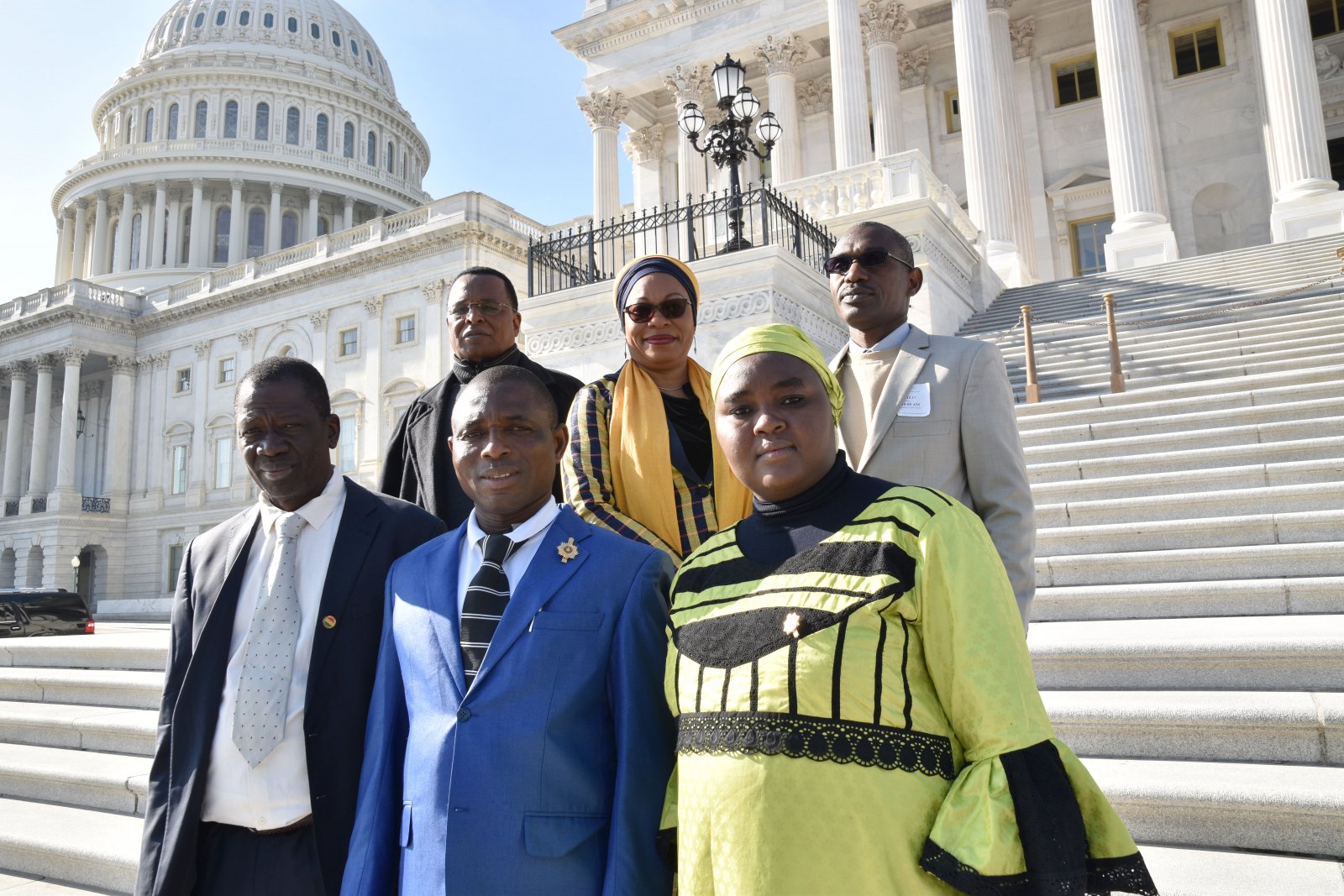
(From left to right) back row: Hon. Belco Ba, Hon. Hélène Marie-Laurence Ilboudo/Marchal, Hon. Mahamadou Manla Chétima; front row: Hon. Bréhima Béridogo, Hon. Ataoueguè Joël Aoué, Hon. Kadi Zakari Hamidou Saidou gather on the steps of the U.S. Capitol during the exchange program, "Parliament's Role in Combating Violent Extremism and Reducing State Fragility," in Washington, D.C.
SHARE
From November 13 to 17, NDI welcomed members of parliament (MPs) from the Sahel region of Africa to Washington, D.C. for a parliamentary exchange program in partnership with the Institute for Representative Government (IRG). The delegation included six MPs from majority and minority parties from Burkina Faso, Mali and Niger who are working in their respective legislatures on combating violent extremism and enhancing citizen security. The program, supported by the State Department’s Office of Citizen Exchanges, focused on the vital role of parliaments in combating violent extremism and reducing state fragility through democratic engagement. During the program, the delegates met with U.S. policy makers and experts to discuss how parliaments can respond effectively to rising threats of violent extremism and strengthen security in the Sahel region and globally.
In recent years, the Sahel has experienced increased levels of instability and violent extremism.
In recent years, the Sahel has experienced increased levels of instability and violent extremism. Burkina Faso has witnessed a spike in terrorism, including attacks on a hotel and restaurants in Ouagadougou in January 2016 and August 2017 that killed almost 50 people. In Mali, Al-Qaeda in the Islamic Maghreb (AQIM) and other armed groups continue to launch deadly attacks in the country, targeting civilians and security personnel; Mali is also known as the UN’s deadliest peacekeeper mission to date. In Niger, Boko Haram, AQIM and their affiliates are attacking both civilian and security sites. In October, four U.S. service members and five Nigerien soldiers were killed by militants in Niger, catapulting the country’s security crisis onto headlines worldwide.
In response to these challenges, MPs in Burkina Faso, Mali and Niger have taken legislative action to strengthen the state’s capacity to detect and deter acts of violence within their borders. The parliamentarians’ efforts include:
- passing laws that restrict the financing of extremist groups and criminal activity;
- exercising oversight over security services and relevant executive branch agencies, and
- appropriating the necessary funds for defense and security.
All three countries are founding members (along with Chad and Mauritania) of the G5 Sahel, a regional partnership established in 2014 to coordinate efforts addressing the security situation. In June 2017, the G5 Sahel member states met in Bamako and pledged to create a rapid response, regional task force to tackle these cross-border security challenges. In October, the G5 deployed its first multinational, joint force military operation.
Over the course of the week, the delegation met with U.S. government officials, staffers and former members of Congress, as well as regional experts and practitioners at the U.S. Department of State, National Security Council, U.S. Agency for International Development and on Capitol Hill. The group also met with subject-matter specialists at the U.S. Institute of Peace, National Endowment for Democracy and National Defense University, as well as with representatives from international non-governmental organizations, such as Mercy Corps and Search for Common Ground. On a visit to Annapolis, Maryland, the delegates discussed security cooperation between federal and state legislative agencies and constituent engagement at the local level with Maryland state security and legislative staff. The exchange program culminated in a public event organized in partnership with the Center for Strategic and International Studies (CSIS) during which the MPs shared their perspective on the causes of, and solutions to, violent extremism with the policy community in Washington, D.C.
Providing economic opportunities and livelihoods, especially for young men, was highlighted by delegates as a key policy intervention in countering the allure of violent extremist groups.
During their meetings, the delegates emphasized the unique role parliamentarians’ play in responding to their constituents’ desire to achieve peace and stability in their current hostile environments. Providing economic opportunities and livelihoods, especially for young men, was highlighted by delegates as a key policy intervention in countering the allure of violent extremist groups. Over the long-term, the delegation noted that development is the only durable solution to address some of the underlying drivers of radicalization and extremism -- a sense of exclusion, the lack of access to basic human rights and the inability to earn a living.


